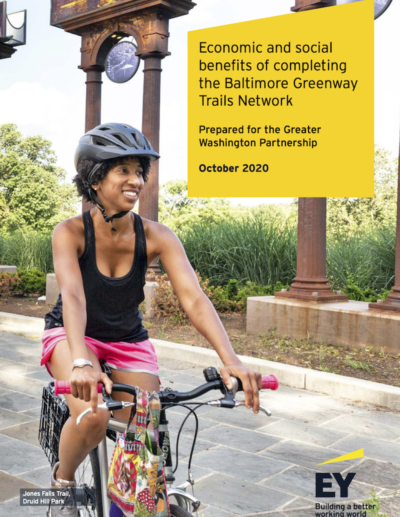Economic and social benefits of completing the Baltimore Greenway Trails Network
Publish Date: October 2020

 Download Report »
Download Report »
This study examines the potential economic and social benefits of a $28m plan to expand and connect existing trails in the city of Baltimore (Baltimore) to create the Baltimore Greenway Trails Network (the Greenway). By building an additional 10 miles of new trails, Baltimore can complete a 35-mile network, providing safe, healthy access to an off-street network that connects 75 neighborhoods to the trails and offers new opportunities. The neighborhoods within a half mile of the Greenway are composed of 58% African-American residents and have a home ownership rate of 48%, which represents similar demographic diversity and home ownership rates to Baltimore.*The completed trail will bring potential economic and social benefits to a wide cross section of Baltimore’s population.
This study describes the Greenway’s “economic footprint” to help stakeholders understand the estimated value created by completing the Greenway, including opportunities arising for the community, workers and local businesses and the flowthrough effects (supply chain and household consumption).
The completion of the Greenway is estimated to support increased economic activity and jobs associated with the construction sector across Baltimore and boost property values for Baltimoreans located close to the completed trail. The expanded trail can provide new walking, biking and scootering opportunities and improve public transportation access, supporting healthy and active lifestyles. A shift to active and public transportation modes can reduce road congestion, resulting in lower vehicle emissions and better health outcomes. Local businesses (e.g., retail) adjacent the trail can also benefit from increased foot and bicycle traffic near their front door.
Ernst & Young LLP (EY US) has prepared this economic impact study for the Greater Washington Partnership to articulate the potential economic benefits of the Greenway’s expansion. This Report will inform subsequent planning efforts, including an equitable development plan to be conducted with community partners and local leaders so that the economic benefits of the Greenway can be enjoyed by everyone through policies that support workforce development, affordable housing, public health, arts and culture, and the equitable allocation of resources.
The estimated benefits associated with the completion of the Greenway have been summarized below.
When compared with the project’s estimated cost of $28m, the estimated benefits of completing the Greenway far exceed the investment.